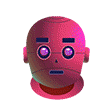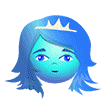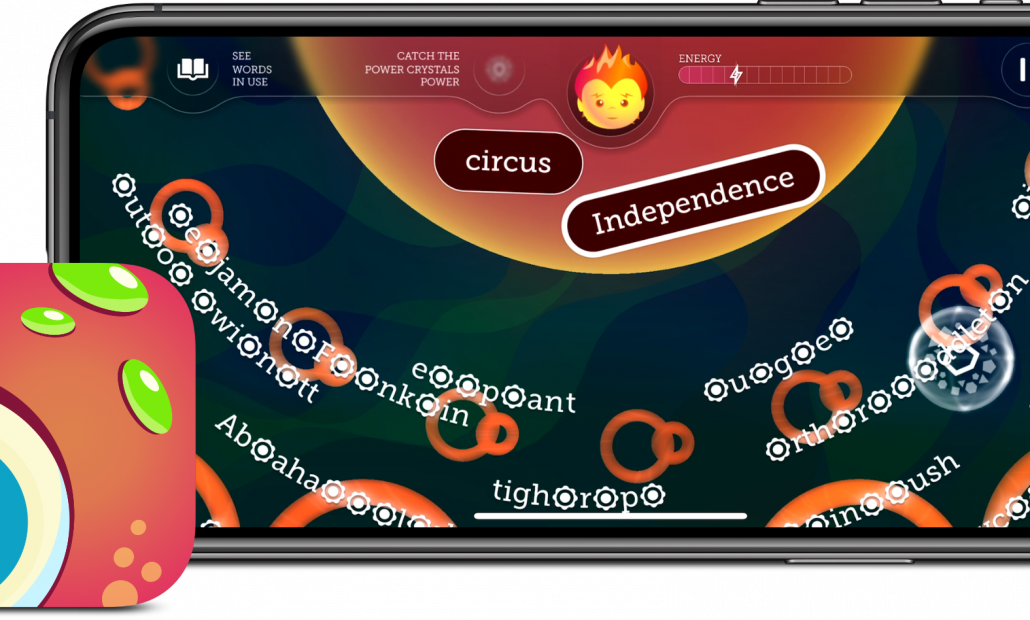Community Embraces New Word Game at Mid-Year Play Day This past Sunday, families at Takoma Park’s Seventh Annual Mid-Year Play Day had the opportunity to experience OtherWordly for the first time. Our educational language game drew curious children and parents to our table throughout the afternoon. Words in Space Several children gathered around our iPads […]
Read moreWordplay meets pinball in space
OtherWordly is an iOS game that combines physics-based gameplay with vocabulary. Players fling words through space toward orbiting targets, solving letter puzzles while calculating trajectories. It’s designed for all ages, with 15 adaptive difficulty levels that adjust automatically from English learners to vocabulary experts.
The game emerged from our research into meaning-based word games—an alternative to the spelling-focused puzzles that dominate the market. NSF funding supported its development alongside our semantic database of 100 million word relationships.
How It Works
Hold a “solar word” at the center—say, OCEAN—and fling it toward orbiting targets with missing letters:
- ocean →
_a_e— bake? cake? date? face? It’s wave - ocean →
_i_e— bite? dine? hike? kite? It’s tide - ocean →
_ha_e— chase? shade? shape? It’s whale
+
Peggle
+
Crosswords
=
OtherWordly
When both the decode and the shot connect, the satisfaction doubles.
The Core Loop
Each solar word has three related targets. Complete all three to advance to the next topic.
The Energy Meter
Every level is a race to fill the meter. Good throws add energy. Misses and mines drain it. Hit zero and you’re done.
Misses: −3
Mines: −4
Combos & vortexes: bonus energy
Golden words spawn vortexes. Two vortexes touching? Super Blast—clears debris, big energy boost.
Four Ways to Play
Narrative Mode
Untimed. Zen. Fill the energy meter. Story unfolds across 7 chapters, 100 levels. Meet characters. Unravel the mystery.
Daily Challenge
Timed race. Targets rain down with gravity. Matches spawn candies to grab. Quick, intense sessions.
Endless Play
Survival mode. Multiple waves. Targets can crash into sun = damage. How long can you last?
Avatar Levels
Boss battles. Clear bumpers. Free the avatar. 3 health. Misses cost you. Relating opposites.
The Story
“A mysterious projectile hurtles through Alphazoid Prime, causing letters to vanish from the galaxy’s words.”
The Vibe
High color contrast. Gently undulating geometric backgrounds. Subtle colorfield splotches. Contemplative even when calculating trajectories.
A 1.5-hour original soundtrack by Yann van der Cruyssen blends chiptune with cosmic ambience. Available on Spotify and Apple Music.
What Makes It Fun
- Mastery — Getting better at aiming, reading trajectories
- Discovery — New words, topics, lore, characters
- Spectacle — Particle effects, chain reactions, vortexes
- Flow — Zen mode’s contemplative rhythm
- Narrative — Mystery unfolding, choices mattering
- Collection — Avatars, achievements, completed challenges
Accessibility

- 15 adaptive difficulty levels — Automatically adjusts from English learners to vocabulary experts
- Kid Mode — Teacher-crafted content, popup definitions, age-appropriate themes
- Accessibility options — Adjustable letter visibility, colorblind modes, dyslexia-friendly fonts, motor accommodations
- Multi-user support — Designed for families and classrooms
Features designed for visual interest also served neurodiverse players in unexpected ways.
Built on the Linguabase, our semantic network of 1.5 million words and 100 million relationships. Learn more about our approach to word games.
Recognition

4 major wins, 10 finalist positions:
- Most Innovative Game — Indie Prize USA, 2019
- Games for Good — Serious Play, 2021
- Best Educational Game — CODiE Awards, 2021
- Arts & Humanities — Reimagine Education, 2021
- Finalist: Best Casual Game — TIGA Awards, 2021
- Finalist: Best Educational or Serious Game — TIGA Awards, 2020
- Finalist: People’s Choice — MEGAMIGS, 2021
- Finalist: EdTech Creator Challenge — GSV/Unity, 2021 (Top 30 of 250)
- NSF SBIR (#2304423, 2023) — $275,000 for development of OtherWordly and In Other Words
- AWS EdStart (2021) — $2,000 cloud credits via EdTech Creator Challenge (Top 30 of 250)
Play
Coming soon to iOS/iPadOS.


